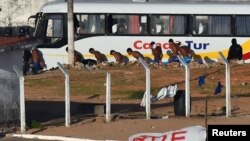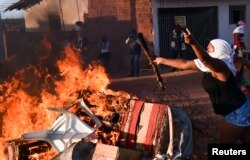Heavily armed police on Wednesday entered the prison where 26 inmates were butchered in recent days and separated members of rival drug gangs waging a turf war that set off a wave of riots in Brazil's overcrowded penitentiary system.
About 220 gang members will be transferred in buses from the Alcacuz penitentiary in the state of Rio Grande do Norte to another prison at Parnamirim, outside the state capital, Natal, authorities said.
The police SWAT team searched the cells and found firearms, a bulletproof jacket and a large quantity of knives, the state's security chief, Caio Bezerra, told reporters.
Police used rubber bullets and tear gas on Tuesday to break up a renewed clash at Alcacuz between the gangs disputing control of the flow of drugs from countries bordering Brazil's Amazon region for shipment to Europe or distribution in the Brazilian market.
The prison was calm Wednesday, and Bezerra said the inmates did not resist the police entry to separate the gangs.
But 13 buses were destroyed by fire in Natal in an apparent protest of the transfer of inmates.
Troops sent to assist
Brazil has been hit by a wave of deadly gang clashes in prisons in the north and northeast regions of the country since the start of the year. At least 140 inmates have been killed in the violence, many decapitated or mutilated.
Brazilian President Michel Temer decided Tuesday to send army troops to northern states to help guard the prisons and deter violence. The soldiers would be limited to inspecting the prisons and confiscating weapons, drugs and other contraband, but would not handle the prisoners.
The clashes are the result of a split between Brazil's most powerful drug gang, the First Capital Command, or PCC, and the second-most powerful gang, the Rio de Janeiro-based Red Command.
The disturbances began on January 1 with a massacre involving the powerful North Family gang, which largely controls a cocaine drug route along the Solimoes River in the Amazon that flows into Colombia and Peru, the world's top two cocaine-producing nations. The clash left 56 inmates dead at a prison in Amazonas state, mostly PCC members.
The PCC retaliated five days later by killing 33 inmates at the Monte Cristo prison in the Amazonian state of Roraima, before carrying out the most recent killings last weekend.






